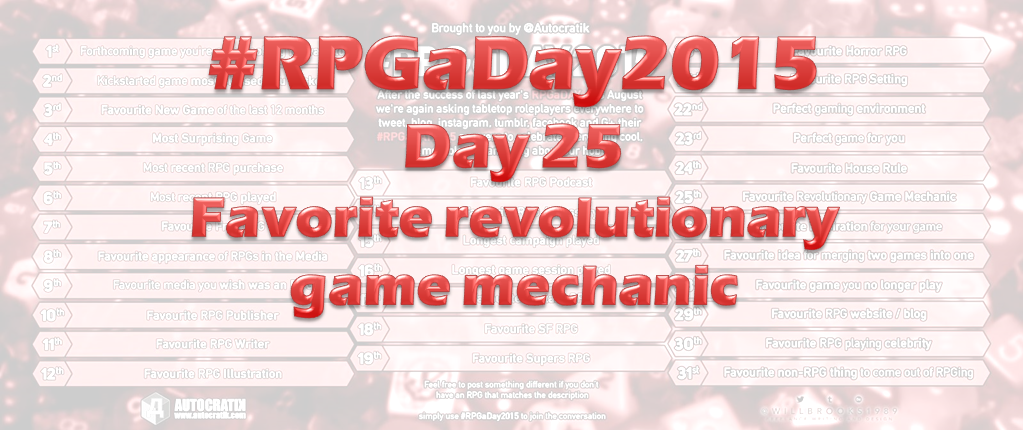Welcome back to the #RPGaDay2015 challenge series, here is another topic I had a hard time coming up with an answer. But let’s go, this one is as short and sweet as yesterday’s post.
Day 25 – Favorite revolutionary game mechanic
The single mechanic, one roll, roll high (such as in the D20 system, but not exclusive to it), simple and elegant. In the case of the D20 System being that I was mostly a D&D player for the longest time, that core concept eliminates a lot of the clutter of previous editions.
Like I said on Sunday’s post, I’m a big fan of roll high simple rolls! Keep the math simple and easy to follow. We understand the idea that rolling high is good instinctively. That for me was a simple shift, but revolutionary in all its possible applications.
What’s yours? Let us know in the comments…


The Fudge Ladder and Dice. (also used by FATE)
In most other games, a skill or attribute is just a number, and that number is just an indirect statement of probability. Difficulty adjectives are presented separately with their own numbers. Rarely are the two directly matched. And dice aren’t so much about “relative to your ability” as they are just being used to generate probability statements (that are then compared to your indirect statements of probability).
In Fudge, your attribute or skill is directly related to the same exact scale that is your difficulty adjectives. And they have a meaningful concept attached to them. You’re not “16 or less on 3d6”, you’re LEGENDARY. The difficulties are similarly matched — a Superb lockpicker will typically barely pick this lock… so the difficulty is Superb. If you’re just Good at lockpicking, this might be a bit harder for you.
And the dice … the dice, whether actual Fudge Dice, or some variant method, the dice are a GODSEND for gaming. Who cares whether you rolled a 4 on some random size of die? I care “did I do a typical job for my skill level?” (a roll of zero) or a little better (+1), a lot better (+2 or +3), or amazingly better (+4). Or, similarly, did I do a little worse than my typical job? or a lot worse? or horribly worse? The dice tell you how well you did compared to whatever your benchmark is. You can tell immediately, without any sort of interpretation, how well you did.
And the dice + attribute is easy to interpret with very little math (and thus very little diversion of mindset away from the story) (really, I’m amazing with math, but less math == more story, so the less math, and less charts, are involved in determining how you did, the better it is for the game)
IMO: the single most important revolution in RPG game mechanics in the 33 years I’ve been gaming.
Second: FATE Aspects, and how they tie into the concept of Story Forward gaming, and help implement a currency of story agency (instead of simply defining the character by sets of probabilities, and their involvement with mechanics that dominate the story).
Third: Drain based Magic systems (sort of like Shadowrun, where you basically take some form of damage/fatigue if you cast a big spell and fail to save against it, or might take no damage/fatigue if you do save against it — the bigger the spell, the harder it is to avoid the Drain).
Fourth: Mana based Magic systems (power points, etc.).
I bet you can tell from that, what my favorite family of RPGs might be 🙂
I will admit that when I first read FUDGE many many years ago, I did not like the ladder, now I can see the elegance. I usually prefer game with better defined rules, creature of habit an all, BUT I really want to play FATE. I have the books, read them but have not run it YET. I think and only played it briefly once! I need to play it more for a better grasp… Thanks for the comment.